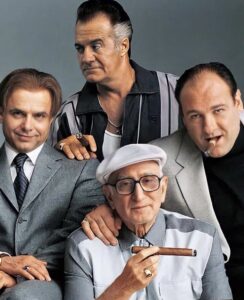
Introduction: Ralph Cifaretto and His Fascination with ‘Gladiator’
In the critically acclaimed TV show The Sopranos, Ralph Cifaretto is one of the most controversial and complicated characters. Known for his volatility, ruthlessness, and occasional bouts of vulnerability, Ralph’s obsession with the 2000 film Gladiator stands out as a fascinating character detail. This fixation raises questions about his psyche, his sense of power, and what it says about his worldview.
But what’s so significant about this obsession? Is it simply a quirky habit, or is there deeper meaning behind it? In this article, we’re going to delve into the reasons behind Ralph Cifaretto’s Gladiator obsession and how it connects to his personality and actions in The Sopranos.

Why ‘Gladiator’ Became Ralph’s Favorite Movie
Ralph Cifaretto’s obsession with Gladiator isn’t just about his love for a movie. It reflects his need for validation and his quest for power. The film, starring Russell Crowe as Maximus, tells the story of a betrayed general seeking revenge while navigating a world of corruption, violence, and power struggles. Ralph sees in Maximus a character who fights for respect and control, qualities that Ralph craves in his own life.
Maximus: A Reflection of Ralph Cifaretto’s Life
Ralph’s obsession with Gladiator can be linked directly to his own life experiences. Just as Maximus fights to reclaim his honor, Ralph struggles with his own sense of self-worth and his place in the mob hierarchy. Ralph constantly vies for attention and approval from Tony Soprano, his boss, while simultaneously grappling with his insecurities and personal demons.
Maximus represents Ralph’s idealized version of masculinity: strong, fearless, and unapologetically dominant. Throughout the series, Ralph is shown to be a man who uses violence and manipulation to get what he wants, traits that align closely with Maximus’ ruthless nature. By watching Gladiator repeatedly, Ralph may be subconsciously trying to align himself with a figure he believes is strong and powerful.
The Gladiatorial Spirit: Ralph’s Desire for Power
One of the key elements of Gladiator is the idea of earning one’s place through battle, both in the literal and metaphorical sense. For Ralph, power is not something given to him; it’s something he believes he must take. Throughout The Sopranos, Ralph is shown to be aggressive in his pursuit of control and dominance, whether it’s over his fellow mobsters or women like Janice Soprano. His obsession with Gladiator speaks to his unyielding desire to seize power and make himself the center of attention.
This gladiatorial spirit is also evident in his violent actions. From the brutal murder of his girlfriend to his involvement in various criminal activities, Ralph’s need to conquer is often expressed through bloodshed and control. In this sense, Gladiator serves as more than just entertainment for him—it’s a blueprint for living.
Ralph Cifaretto’s Relationship with Tony Soprano
Ralph’s obsession with Gladiator also sheds light on his complex and often contentious relationship with Tony Soprano. Although Ralph seeks validation and approval from Tony, their interactions are marked by tension, jealousy, and competition.
Ralph’s Need for Approval

Throughout the series, Ralph frequently tries to prove himself to Tony. He wants to be seen as a legitimate player in the mob, someone who is not only feared but respected. In this way, Gladiator becomes a metaphor for Ralph’s relationship with Tony. Just as Maximus seeks the favor of the Roman Emperor Commodus, Ralph is constantly seeking Tony’s approval, even though their dynamic is marked by rivalry.
Ralph’s desire for Tony’s respect can be seen in his actions and his behavior toward him. In the episode “House Arrest,” when Tony is stuck at home and Ralph is trying to prove his worth, his obsession with Gladiator comes to the forefront. Ralph’s continual references to the movie indicate that he sees himself as a fighter, someone deserving of respect, and someone who should be at the top of the mob food chain.
The Power Struggle
The tension between Ralph and Tony intensifies when Ralph starts to push boundaries, trying to usurp Tony’s position and claim more power. This power struggle reflects the gladiatorial conflict in Gladiator, where Maximus fights not just for survival but for the ultimate position of power. Similarly, Ralph’s relentless ambition leads to conflicts that ultimately cost him.
The movie’s themes of betrayal and revenge also mirror the fractured relationship between Tony and Ralph. Just as Maximus is betrayed by those closest to him, Ralph is involved in several betrayals within the mob, including his conflict with Tony, which ultimately leads to his downfall.
Ralph Cifaretto’s Violence and Unpredictability
Another striking parallel between Ralph and Maximus is their shared penchant for violence. In Gladiator, Maximus is both a skilled warrior and a symbol of vengeance, two traits that Ralph embodies as well. Ralph’s brutal, impulsive actions—whether it’s his violent outbursts or his role in numerous killings—reflect the gladiatorial mindset of overcoming challenges with force.
Ralph’s Killings and Their Connection to Gladiatorial Combat
Just like the gladiators who fought to the death for survival, Ralph often takes matters into his own hands, using violence to solve problems. His role in the killing of multiple people throughout the series is a testament to his belief that physical dominance is the ultimate form of power. In The Sopranos, violence is a recurring theme, and Ralph’s actions amplify this dark aspect of the show.
Ralph’s killing of his girlfriend, Tracee, in season 3 is one of the most infamous and chilling moments in the series. This violent act not only reveals Ralph’s capacity for brutality but also serves as an unsettling reminder of his ability to view human life as expendable—a characteristic shared by the gladiators in the arena.
The Tragic End of Ralph Cifaretto
Ralph’s obsession with Gladiator reaches its tragic conclusion in the later seasons of The Sopranos. His rise and fall follow a narrative similar to that of Maximus, a character who is ultimately consumed by his ambition and his quest for power.
Ralph’s Death and Its Symbolic Meaning
Ralph’s death at the hands of Tony Soprano in Season 4 is a pivotal moment in the series. It marks the end of his power struggle and his relentless pursuit of dominance. This event mirrors the downfall of Maximus in Gladiator, who, despite all his victories, is ultimately betrayed and killed. For Ralph, his obsession with power and violence ultimately leads to his demise, much like the tragic end of his gladiatorial idol.
Conclusion: Ralph’s Obsession as a Reflection of His Inner Turmoil
Ralph Cifaretto’s obsession with Gladiator is more than just an eccentricity—it is a reflection of his deeper psychological struggles. Through his admiration for Maximus, Ralph seeks validation, power, and control, and his obsession serves as a lens through which we can better understand his violent and unpredictable nature. Ultimately, Ralph’s fixation on the film highlights the tragic nature of his character: a man consumed by his own need for dominance, unable to escape the cycle of violence that defines his life.